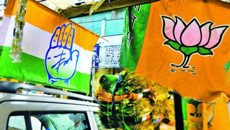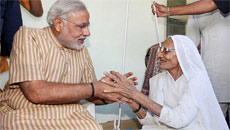No more piles of dog-eared files and clipped paper stacks littering office desks. It is the time of e-files in the new government of Prime Minister Narendra Modi.
The prime minister, who has sought to embrace technology in governance with messianic zeal, has directed officials - ranging from secretaries, joint secretaries and section officers - of different ministries to clear files electronically.
The system is not new. It was introduced around a year ago under the UPA government. But no one really bothered.
But with Modi giving strict instructions that "no heaps of files" should be found littering office desks, shelves, window sills and even top of airconditioners and that office spaces should not remain cluttered, all senior government functionaries have made a concerted move to go electronic.
"The new government is stressing on making files totally electronic, to end the paper version as far as possible," a senior official told IANS declining to be named.
The National Informatics Centre, which is under the Ministry of Communications and Information Technology, has a "safe and secure server" on which the government communication machinery is run. "The NIC servers are well protected with firewalls to prevent hacking," the official added.
As part of the e-filing, offices are set to be equipped with superior electronic scanners that would enable officials to scan any document and upload instantly.
"We are getting good quality scanners, which are essential to scan documents, especially in legal cases," said another official.
"Earlier, orderlies (peons) would carry the files from one official's door to the other. Now it will be done with the click of a button," said an official.
The order to push ahead with electronic filing was given by the Department of Personnel and Training, which is under Prime Minister Narendra Modi
"This is part of the prime minister's order for cleanliness, quick disposal of files and speed," another official told IANS.
According to the official, the NIC server is powerful and traffic moves fast on it. Only in case the power goes off for more than half an hour would the computers become ineffective. The backup power would help computers to move for around half an hour, he said.
Files are also being pushed fast by the new government.
"Earlier, files would keep pending for weeks, sometimes months. Some ministers in the UPA government would sit on files endlessly. The new ministers are signing the files left over by the previous government within minutes. The speed is catching on, and officials are also not sitting on files any longer," said an official.
Citing an example, he said that former information and broadcasting minister Manish Tewari, though known for his erudition, had a penchant for sitting on files. He did not clear files quickly. He would send notings on every file, sometimes seven-page long, and ask that the specific points he had raised to be referred to the law ministry or the finance ministry, said a knowledgeable source.
"We sometimes had to sit with a dictionary to decipher the difficult language he used in his notings," said one official, who said he was speaking only on the assurance that he was not identified. Tewari could not be reached for comment.
In contrast, the new minister Prakash Javadekar has been clearing files in a jiffy.
Another factor that has enthused the secretaries and other senior officials is that the Modi government has "reposed a lot of trust and faith" in the officials.
"There is a general faith (of the government) in the bureaucracy, and we are told to take decisions. This has given us new confidence," said a senior official.
Modi held a meeting with more than 70 secretaries last week during which he told them to work without fear and said he would protect them against malicious prosecution against justified decisions.





